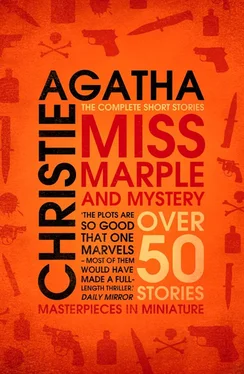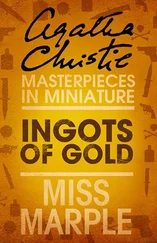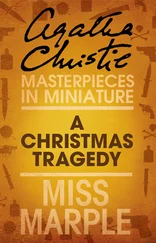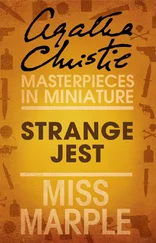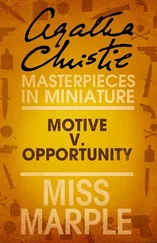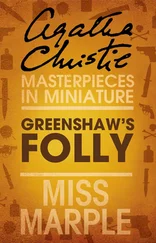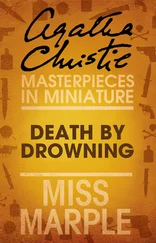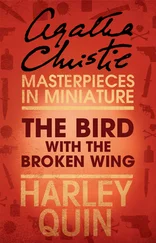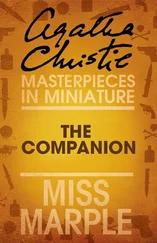‘A romantic wedding took place yesterday in London when Lord Roland Gaigh, second son of the Marquis of Axminster, was married to the Grand Duchess Anastasia of Catonia. The ceremony was kept a profound secret. The Grand Duchess has been living in Paris with her uncle since the upheaval in Catonia. She met Lord Roland when he was secretary to the British Embassy in Catonia and their attachment dates from that time.’
‘Well, I’m –’
Mr Rowland could not think of anything strong enough to express his feelings. He continued to stare into space. The train stopped at a small station and a lady got in. She sat down opposite him.
‘Good-morning, George,’ she said sweetly.
‘Good heavens!’ cried George. ‘Elizabeth!’
She smiled at him. She was, if possible, lovelier than ever.
‘Look here,’ cried George, clutching his head. ‘For God’s sake tell me. Are you the Grand Duchess Anastasia, or are you Betty Brighteyes?’
She stared at him.
‘I’m not either. I’m Elizabeth Gaigh. I can tell you all about it now. And I’ve got to apologize too. You see, Roland (that’s my brother) has always been in love with Alexa –’
‘Meaning the Grand Duchess?’
‘Yes, that’s what the family call her. Well, as I say, Roland was always in love with her, and she with him. And then the revolution came, and Alexa was in Paris, and they were just going to fix it up when old Stürm, the chancellor, came along and insisted on carrying off Alexa and forcing her to marry Prince Karl, her cousin, a horrid pimply person –’
‘I fancy I’ve met him,’ said George.
‘Whom she simply hates. And old Prince Usric, her uncle, forbade her to see Roland again. So she ran away to England, and I came up to town and met her, and we wired to Roland who was in Scotland. And just at the very last minute, when we were driving to the Registry Office in a taxi, whom should we meet in another taxi face to face, but old Prince Usric. Of course he followed us, and we were at our wits’ end what to do because he’d have made the most fearful scene, and, anyway, he is her guardian. Then I had the brilliant idea of changing places. You can practically see nothing of a girl nowadays but the tip of her nose. I put on Alexa’s red hat and brown wrap coat, and she put on my grey. Then we told the taxi to go to Waterloo, and I skipped out there and hurried into the station. Old Osric followed the red hat all right, without a thought for the other occupant of the taxi sitting huddled up inside, but of course it wouldn’t do for him to see my face. So I just bolted into your carriage and threw myself on your mercy.’
‘I’ve got that all right,’ said George. ‘It’s the rest of it.’
‘I know. That’s what I’ve got to apologize about. I hope you won’t be awfully cross. You see, you looked so keen on its being a real mystery – like in books, that I really couldn’t resist the temptation. I picked out a rather sinister looking man on the platform and told you to follow him. And then I thrust the parcel on you.’
‘Containing a wedding ring.’
‘Yes. Alexa and I bought that, because Roland wasn’t due to arrive from Scotland until just before the wedding. And of course I knew that by the time I got to London they wouldn’t want it – they would have had to use a curtain ring or something.’
‘I see,’ said George. ‘It’s like all these things – so simple when you know! Allow me, Elizabeth.’
He stripped off her left glove, and uttered a sigh of relief at the sight of the bare third finger.
‘That’s all right,’ he remarked. ‘That ring won’t be wasted after all.’
‘Oh!’ cried Elizabeth; ‘but I don’t know anything about you.’
‘You know how nice I am,’ said George. ‘By the way, it has just occurred to me, you are the Lady Elizabeth Gaigh, of course.’
‘Oh! George, are you a snob?’
‘As a matter of fact, I am, rather. My best dream was one where King George borrowed half a crown from me to see him over the week-end. But I was thinking of my uncle – the one from whom I am estranged. He’s a frightful snob. When he knows I’m going to marry you, and that we’ll have a title in the family, he’ll make me a partner at once!’
‘Oh! George, is he very rich?’
‘Elizabeth, are you mercenary?’
‘Very. I adore spending money. But I was thinking of Father. Five daughters, full of beauty and blue blood. He’s just yearning for a rich son-in-law.’
‘H’m,’ said George. ‘It will be one of those marriages made in Heaven and approved on earth. Shall we live at Rowland’s Castle? They’d be sure to make me Lord Mayor with you for a wife. Oh! Elizabeth, darling, it’s probably contravening the company’s by-laws, but I simply must kiss you!’
‘While the Light Lasts’ was first published in Novel Magazine , April 1924.
The Ford car bumped from rut to rut, and the hot African sun poured down unmercifully. On either side of the so-called road stretched an unbroken line of trees and scrub, rising and falling in gently undulating lines as far as the eye could reach, the colouring a soft, deep yellow-green, the whole effect languorous and strangely quiet. Few birds stirred the slumbering silence. Once a snake wriggled across the road in front of the car, escaping the driver’s efforts at destruction with sinuous ease. Once a native stepped out from the bush, dignified and upright, behind him a woman with an infant bound closely to her broad back and a complete household equipment, including a frying pan, balanced magnificently on her head.
All these things George Crozier had not failed to point out to his wife, who had answered him with a monosyllabic lack of attention which irritated him.
‘Thinking of that fellow,’ he deduced wrathfully. It was thus that he was wont to allude in his own mind to Deirdre Crozier’s first husband, killed in the first year of the War. Killed, too, in the campaign against German West Africa. Natural she should, perhaps – he stole a glance at her, her fairness, the pink and white smoothness of her cheek; the rounded lines of her figure – rather more rounded perhaps than they had been in those far-off days when she had passively permitted him to become engaged to her, and then, in that first emotional scare of war, had abruptly cast him aside and made a war wedding of it with that lean, sunburnt boy lover of hers, Tim Nugent.
Well, well, the fellow was dead – gallantly dead – and he, George Crozier, had married the girl he had always meant to marry. She was fond of him, too; how could she help it when he was ready to gratify her every wish and had the money to do it, too! He reflected with some complacency on his last gift to her, at Kimberley, where, owing to his friendship with some of the directors of De Beers, he had been able to purchase a diamond which, in the ordinary way, would not have been in the market, a stone not remarkable as to size, but of a very exquisite and rare shade, a peculiar deep amber, almost old gold, a diamond such as you might not find in a hundred years. And the look in her eyes when he gave it to her! Women were all the same about diamonds.
The necessity of holding on with both hands to prevent himself being jerked out brought George Crozier back to the realities. He cried out for perhaps the fourteenth time, with the pardonable irritation of a man who owns two Rolls-Royce cars and who has exercised his stud on the highways of civilization: ‘Good Lord, what a car! What a road!’ He went on angrily: ‘Where the devil is this tobacco estate, anyway? It’s over an hour since we left Bulawayo.’
‘Lost in Rhodesia,’ said Deirdre lightly between two involuntary leaps into the air.
Читать дальше
